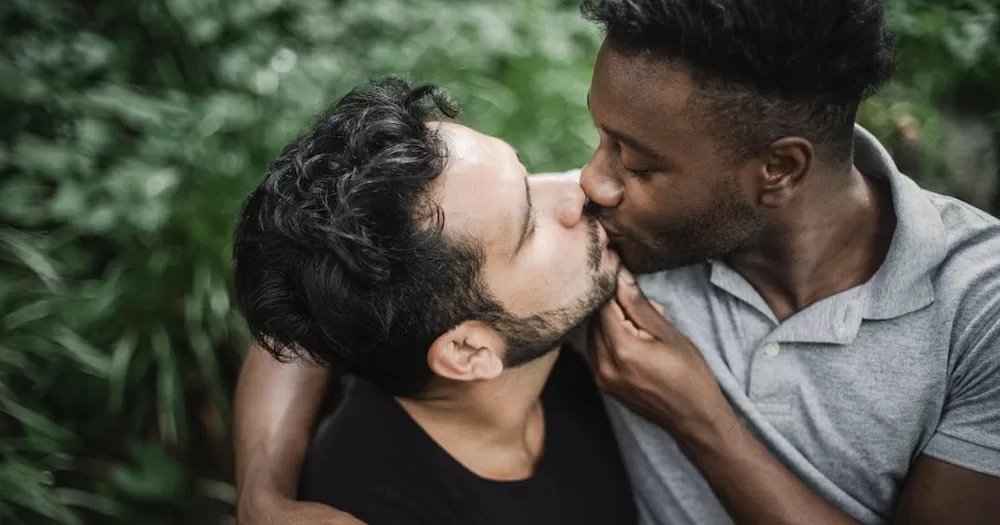We kiss our loved ones to express affection, we kiss strangers in the club, we kiss our partners to show love. For some LGBTQ+ folks, kissing can be also self-discovery, a way to understand what – or better yet, whom – we’re attracted to. It is such a commonplace practice that we don’t even stop to question it anymore. Yet, for all the pecks and smooches that we give or receive in our lives, do we actually know why humans kiss?
According to some, kissing is a learned behaviour rather than an instinctual one. As this theory explains, it dates back to our early ancestors and how mothers used to chew food before passing it from their mouths to those of their toothless babies (kind of gross, we agree).
This theory seems to be supported by the fact that kissing is actually not a universal human experience. While about 90% of the people on earth do kiss, there are certain tribes around the world that simply don’t do it.
However, another theory behind the reason why we kiss is an exchange of data. Very clinical, I know, but apparently our lips are densely populated with nerve endings, which allow us to pick up on temperature, taste, smell and other bits of information. The load of data that we get from a smooch then allows us to unconsciously assess potential partners.
I literally have thought about the Rue & Jules underwater Romeo & Juliet kiss everyday single for 2 years straight https://t.co/CSqZh6gI6M pic.twitter.com/BGJVTSfCpB
— Principal Ava Coleman stan (@1ux1isbon) August 14, 2022
Scholars who support this theory believe that there are such things as deal-breaking kisses, also referred to as “kisses of death” (a bit grim, but ok), which determine whether or not someone chooses another person as a partner. This, however, doesn’t necessarily mean that the people involved are bad at smooching, as kissing is a very personal experience and someone can be a good kisser to one while being a bad kisser to another. If we find someone that we like making out with very much, it might be an indication of the fact that we’ve found a good match.
Lastly, another vastly popular theory behind why we lock lips is that it simply feels good. Those millions of nerve endings on our lips are activated when they come into contact with another’s and they cause all sorts of chemical reactions in our brains.
That kiss between Ennis and Jack is iconic pic.twitter.com/QjHQT6dMZk
— Irma (@IrWayLiberal) August 2, 2017
As biological anthropologist Helen Fisher explains, a kiss can drive up our dopamine system and dopamine is associated with feelings of romantic love. Moreover, kissing may cause bursts of oxytocin, also referred to as the “cuddle hormone”, which stirs up feelings of affection and attachment. Last but not least, it reduces our levels of cortisol, the body’s main stress hormone.
With all the benefits that we get from a bit of lip-locking, it’s really no surprise that we do it so often. And the relevance of kissing becomes even more clear if we reflect on the fact that sometimes we are not allowed to do it. Something as common as kissing is still precluded to some – be it for unease, fear or even, in certain context, the law – which is why every last one of our kisses should be special.
7. Kelly and Yorkie: The San Junipero kiss that made me cry rapid hot TEARS pic.twitter.com/JcwE4vDvUD
— Kiki (@kianangu) August 18, 2020
© 2023 GCN (Gay Community News). All rights reserved.
Support GCN
GCN is a free, vital resource for Ireland’s LGBTQ+ community since 1988.
GCN is a trading name of National LGBT Federation CLG, a registered charity - Charity Number: 20034580.
GCN relies on the generous support of the community and allies to sustain the crucial work that we do. Producing GCN is costly, and, in an industry which has been hugely impacted by rising costs, we need your support to help sustain and grow this vital resource.
Supporting GCN for as little as €1.99 per month will help us continue our work as Ireland’s free, independent LGBTQ+ media.
